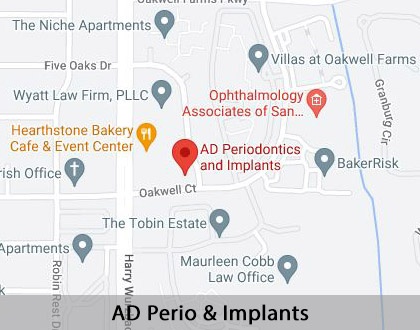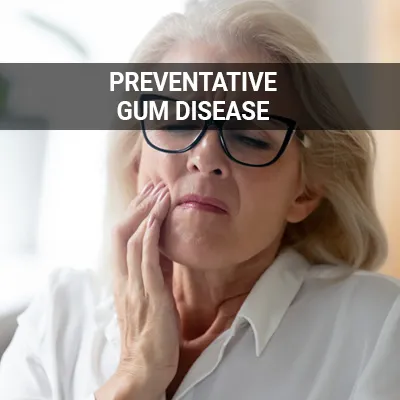Halitosis San Antonio, TX
Halitosis, or chronic bad breath, often indicates a more serious condition in the mouth, nose, or throat. It does not merely go away with mints or mouthwash. In most cases, halitosis is a sign of an oral condition such as cavities or gum disease, a mouth, nose, or throat infection, dry mouth, or an effect from smoking. If you are experiencing chronic bad breath and have tried temporary fixes, it is highly possible that you may be suffering from halitosis and need treatment.
Halitosis is available at AD Perio & Implants in San Antonio and the surrounding area. Our team can examine your mouth and surrounding structures to determine the cause and suggest treatment options for your condition. Call us today at (210) 805-8400 to schedule an appointment or learn more about our services.
What Is Halitosis?
Halitosis is an oral health problem that causes chronic bad breath and is not easily remedied through temporary fixes. Although bad breath can be embarrassing, the main concern is whether there is an underlying condition causing the symptoms. There are many causes of halitosis, but poor oral hygiene is the most common culprit.
Halitosis is easily preventable and highly treatable. The first course of action a patient should take is to seek evaluation to identify the root cause of their condition. Once a cause has been discovered, a treatment plan is put in place to treat the underlying condition and then allow the body to recover. In most cases, bad breath is remedied through the treatment of the underlying cause and educating the patient on poor oral hygiene habits that are contributing to their condition.
“The first course of action a patient should take is to seek evaluation to identify the root cause of their condition.”
Common Causes of Halitosis
There are many oral and general health conditions that can cause halitosis, but it is most commonly caused by poor oral hygiene. According to John Hopkins Medicine, sources of bacteria build-up in the mouth are most often a result of:
- Certain foods
- Dry mouth
- Health conditions, such as a respiratory infection, diabetes, gastrointestinal disorder, or a liver or kidney disorder
- Improper denture cleaning
- Periodontal disease
- Poor oral health care
- Tobacco products
- Uncleaned bacteria on the tongue
The oral-systemic health connection posits that the mouth is the gateway to the rest of the body. Therefore, bacteria and infection in the mouth can lead to general health conditions and vice versa. When looking for a cause of halitosis, our team will look at any and all contributing factors that may be associated with the condition.
“There are many oral and general health conditions that can cause halitosis, but it is most commonly caused by poor oral hygiene.”
Symptoms of Halitosis
The most significant symptom of halitosis is bad breath or emanation of an ill odor. This can lead to embarrassment, fear of speaking, and attempts to handle the situation with temporary fixes. It is often difficult to assess bad breath on one's own, and it may seem that the problem stems from usual causes, such as coffee, tea, onions, garlic, etc. However, halitosis is an oral condition, namely chronic bad breath, and does not go away through brushing or mouth washing.
One way of determining whether one has halitosis is licking the wrist, letting it dry, and smelling it once dry. If there is an odor, it is highly likely that the person suffers from the condition. Other symptoms include dry mouth, changes in taste when eating, and a white-coated tongue. It is crucial that patients see a dentist immediately as this could be a sign of a more serious oral or general health condition. While halitosis itself is treatable, the body could be revealing a condition that needs monitoring and care.
“The most significant symptom of halitosis is bad breath or emanation of an ill odor.”
Check out what others are saying about our dental services on Yelp: Halitosis in San Antonio, TX
Risk Factors
Halitosis does not generally result suddenly or on its own. Some patients may be more at risk of developing halitosis than others, such as those who smoke, those with poor oral hygiene habits, those with dry mouth, and those with certain medical conditions, as stated above. Pregnancy can also contribute to the risk of halitosis because of nausea, morning sickness, and hormonal changes that commonly occur.
To prevent halitosis, especially for patients who are at a higher risk, it is important to follow stricter oral health care and visit a dentist more often. Keep hydrated to prevent dry mouth, brush teeth at least twice daily in the morning and before bed, and reduce or quit smoking. We recommend patients brush the entirety of their mouth to remove any and all bacteria; this includes the teeth, gums, inner cheeks, roof of the mouth, and tongue. Rinse with warm water and salt or mouthwash regularly, especially after odor-causing foods and beverages.
“Pregnancy can also contribute to the risk of halitosis because of nausea, morning sickness, and hormonal changes that commonly occur.”
Questions Answered on This Page
Q. What are the common causes of halitosis?
Q. What are the symptoms of halitosis?
Q. What are the risk factors for halitosis?
Q. What are the available treatments for halitosis?
People Also Ask
Q. What are some of the symptoms of gingivitis?
Q. What are some treatment options for oral inflammation? What are some things I can do at home?
Q. Why would I need a gum dentist?
Q. What is a periodontal cleaning?
Treatments for Halitosis
To properly treat halitosis, we must first diagnose the underlying cause. Bad breath odor originates in the throat, so we may scrape the tongue and test it. There are various detectors for rating chemicals in odors to determine their cause and consistency.
Once a diagnosis is made, we can help treat the patient for any oral health conditions and give them recommendations based on our findings. Common treatments for halitosis involve special mouthwashes and toothpaste, tongue scrapers, and dental treatments. Since halitosis is often the result of oral health conditions, it is important to treat those first and undergo a professional dental cleaning to remove bacteria throughout the mouth. Lifestyle changes and practicing stringent hygiene habits can play a significant role in eliminating odor-causing bacteria as well.
“Common treatment for halitosis involves special mouthwashes and toothpaste, tongue scrapers, and dental treatments.”
Frequently Asked Questions
Q. What is halitosis?
A. Halitosis is an oral condition that causes persistent, chronic bad breath. Its symptoms do not go away with temporary fixes such as brushing and mouthwash. Halitosis most commonly occurs as a result of an oral or general health condition, poor oral hygiene, and smoking.
Q. What is the difference between bad breath and halitosis?
A. Temporary bad breath can result from the consumption of ill-odor foods and beverages, such as onions, garlic, or coffee and tea. However, temporary bad breath can be remedied through brushing, flossing, and the use of mints or mouthwash. Halitosis is chronic and persistent, indicating that there is a more serious condition affecting the breath.
Q. Can halitosis be treated?
A. Halitosis is highly treatable and easily preventable. Even though it is often caused by another condition, treating the underlying cause will gradually mitigate or eliminate bad breath. There are many lifestyle changes and hygiene habits that help prevent symptoms as well.
Q. How can I treat halitosis symptoms at home while awaiting treatment?
A. Many conditions that affect halitosis take a few treatments until a patient fully recovers. In the meantime, we recommend brushing teeth throughout the day, using a mouthwash or rinse after each meal, using a tongue scraper to remove bacteria, and visiting the dentist regularly. It is also beneficial to reduce or quit smoking and avoid foods and beverages that contribute to the condition.
Q. How long does halitosis last?
A. Halitosis is often a temporary condition. Once a patient seeks treatment, symptoms should gradually dissipate. You can also implement our recommended lifestyle and hygiene habits at home for faster results. Undergoing treatment for underlying conditions is the most effective way of treating halitosis.
Start Feeling Better – Visit Us Today
By visiting us as soon as possible, our team can help get you the professional treatment you need. Instead of waiting around and allowing the symptoms to get worse, we can provide you with treatment options.
Definitions
Call Us Today
If you are suffering from chronic bad breath and cannot seem to solve the problem on your own, call us today for a proper diagnosis and treatment plan. Our team can help review methods to keep symptoms at bay and prevent the halitosis from occurring again. Call our office at (210) 805-8400 to learn more or schedule an appointment.
Helpful Related Links
- American Academy of Periodontology (AAP). American Academy of Periodontology (AAP). 2023
- Center for Disease Control and Prevention (CDC), Periodontal Disease Page. Center for Disease Control and Prevention (CDC), Periodontal Disease Page. 2023
- WebMD, What Is a Periodontist?. WebMD, What Is a Periodontist?. 2023
About our business and website security
- AD Perio & Implants was established in 2020.
- We accept the following payment methods: American Express, Cash, Check, Discover, MasterCard, and Visa
- We serve patients from the following counties: Bexar County, Kendall County, Comal County, and Guadalupe County
- We serve patients from the following cities: San Antonio, Alamo Heights, Terrell Hills, Universal City, Boerne, Stone Oak, New Braunfels, Bulverde, Fair Oaks Ranch, Garden Ridge, Selma, and Castle Hills
- Norton Safe Web. View Details
- Trend Micro Site Safety Center. View Details
Back to top of Halitosis







